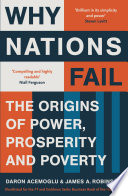
From "Why Nations Fail"
Inclusive versus Extractive Economic Institutions
Key Economic Insight
Economic institutions are the fundamental rules and incentives shaping how an economy operates and individual behavior within it. Two primary types emerge: inclusive and extractive. Inclusive economic institutions foster broad participation in economic activities, enabling individuals to fully utilize their talents and make personal choices. Key features include secure private property rights, an impartial legal system, readily available public services, and the freedom for new businesses to enter and for people to choose their careers. These institutions are critical for encouraging investment, innovation, and overall economic prosperity, as exemplified by South Korea and the United States.
However, merely having property rights for some does not make institutions inclusive; for instance, in 1680 Barbados, despite 175 large sugar planters having secure rights over their land and 39000 slaves within a total population of 60000, the institutions were not inclusive because two-thirds of the population were enslaved with no economic opportunities. In general, extractive economic institutions are structured to concentrate wealth and income from the majority of society into the hands of a select few. Under these systems, private property is often nonexistent for the general populace or highly insecure, and individuals face mass coercion.
The state under extractive institutions typically fails to provide essential public services that promote widespread prosperity; instead, it may enforce a biased legal system or even actively undermine its subjects' rights, as seen in North Korea or colonial Latin America's 'mita' and 'encomienda' systems. These institutions suppress economic decision-making and innovation, making sustained growth unlikely. Conversely, for inclusive institutions to thrive, the state must possess the coercive capacity to uphold law and order, prevent theft and fraud, enforce contracts, and deliver crucial public services like infrastructure, as defined by Max Weber's 'monopoly of legitimate violence'.
📚 Continue Your Economic Learning Journey
Access the complete Why Nations Fail summary with audio narration, key takeaways, and actionable insights from Daron Acemoglu, James A. Robinson.